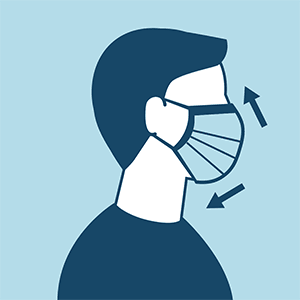Whether you mark holidays in December or not, typical winter customs are being disrupted. The pandemic has had a significant impact on society’s ability to connect and has also reduced individuals’ access to wellness-maintaining strategies and activities. …
Read the full article by Kerri Ritchie and Caroline Gerin-Lajoie here: (https://theconversation.com/pandemic-december-how-to-stay-connected-and-resilient-in-a-covid-19-holiday-season-150678
August 18, 2020 – APNL Press Release:
Psychological Strategies for Wearing Masks
The NL government recently announced the mandatory wearing of masks in all public spaces for individuals over the age of 5. While some individuals have been routinely wearing masks for many months, either as part of their work, or while running errands, for many this will be a new, and somewhat uncomfortable situation. Fortunately, Psychologists can help! Becoming accustomed to wearing a mask is just like making any other kind of behavioural change.
Click here for the Press Release (PDF)
Prepared by
Dr. Mélanie Joanisse, C.Psych.
Clinical and Health Psychologist
Disclaimer: the tools provided in this workbook are not intended to be viewed as a replacement for psychological services provided by a trained professional. Please seek professional help if needed.

CDC recommends wearing cloth face coverings in public settings where other social distancing measures are difficult to maintain (e.g., grocery stores and pharmacies), especially in areas of significant community-based transmission.
CDC also advises the use of simple cloth face coverings to slow the spread of the virus and help people who may have the virus and do not know it from transmitting it to others. Cloth face coverings fashioned from household items or made at home from common materials at low cost can be used as an additional, voluntary public health measure.
Use of Cloth Face Coverings during Pandemic: Wearing, Maintaining and Making Cloth Face Coverings
The Ottawa Institute of Cognitive Behavioural Therapy has a podcast covering many of the psychological impacts of COVID-19. Interviews with Dr. Kim Corace, Dr. Keith Dobson, and many others can be heard here: https://www.buzzsprout.com/811163
Answers to your questions about CPA’s initiative to give back to front line service providers during the COVID-19 pandemic.
Education & Training in Health Service Psychology – COVID-19 – Joint Statement Updated 3-19-2020
The Association of Psychology Postdoctoral and Internship Centers (APPIC), the American Psychological Association (APA), the Canadian Psychological Association (CPA) and the Association of State and Provincial Psychology Boards (ASPPB) have received questions and concerns from programs and students concerned about how COVID-19 will impact their training experiences and if it will impact their completion of degree requirements. The range of ever-changing information, sometimes conflicting, from different organizations in which psychology graduate students train throughout the U.S. and Canada has contributed to increasing anxiety. …
Click here for the full statement
